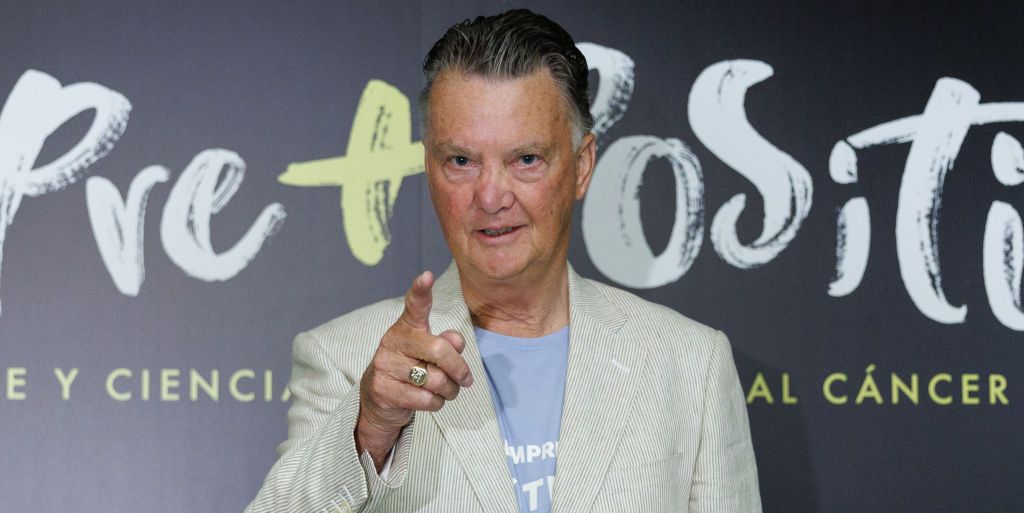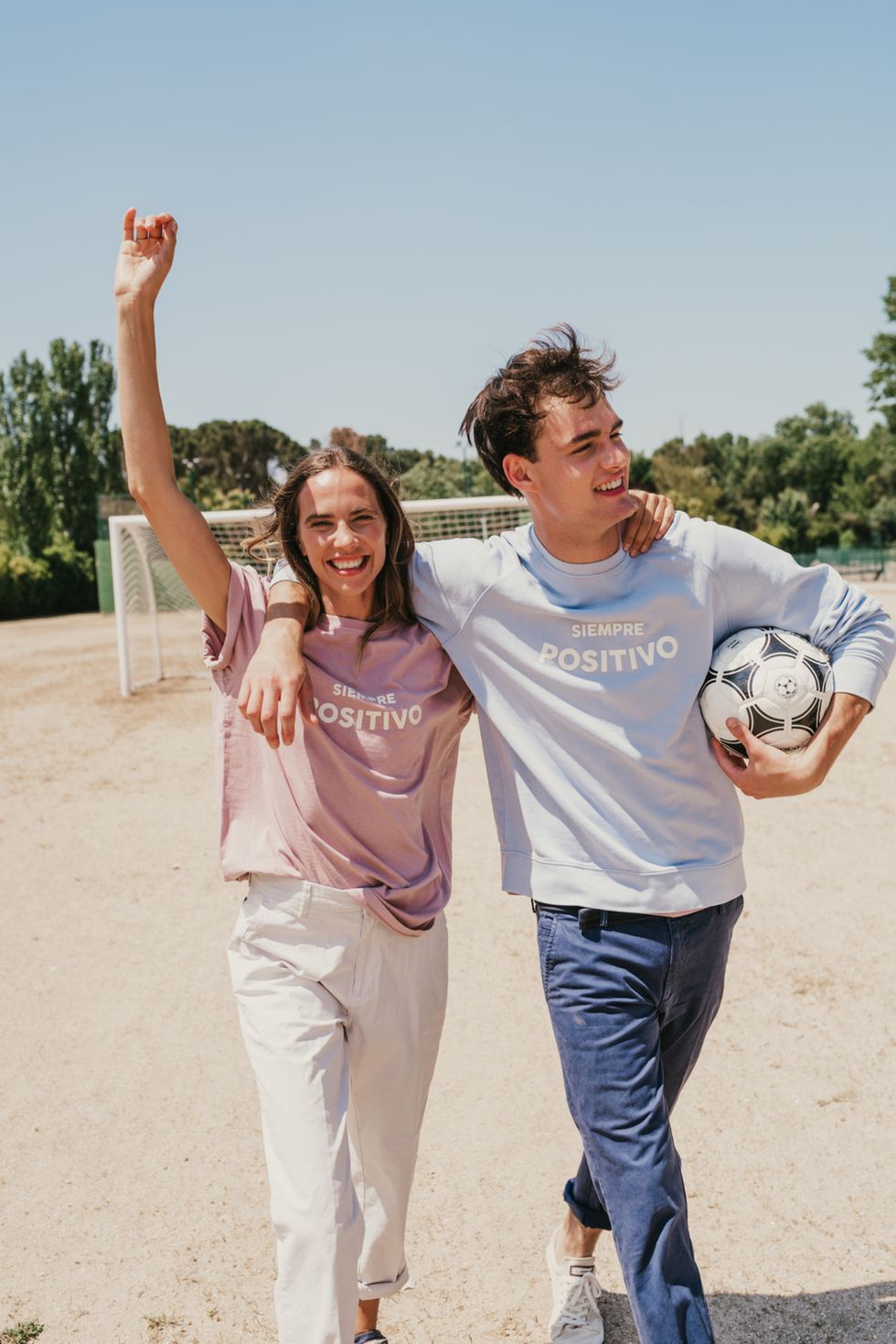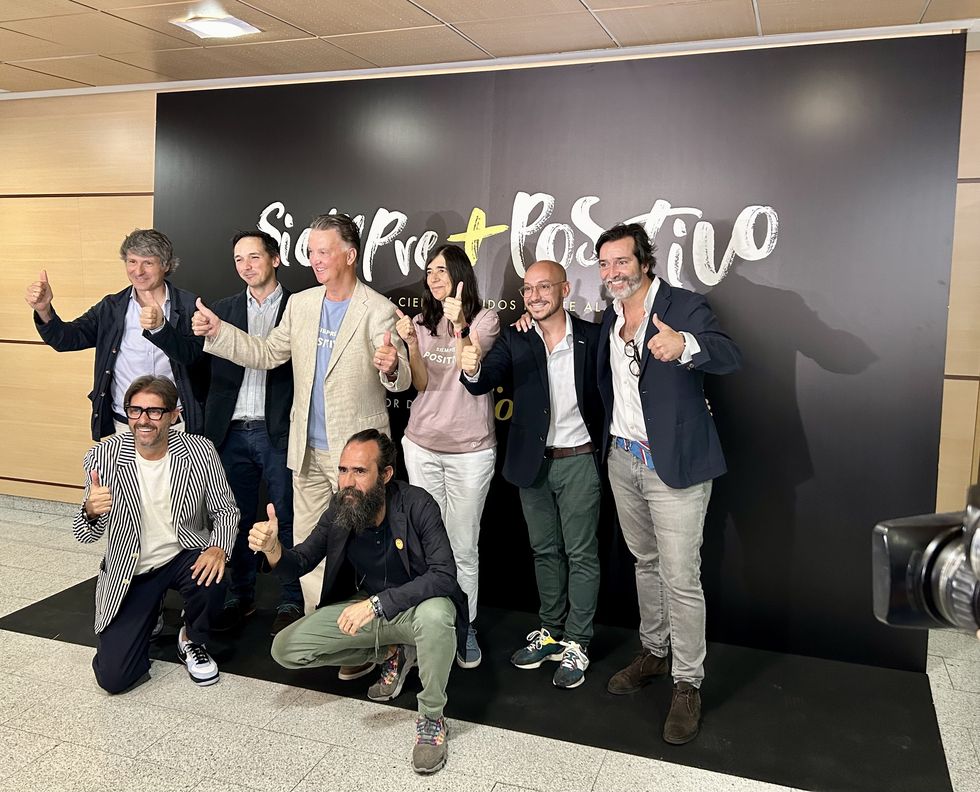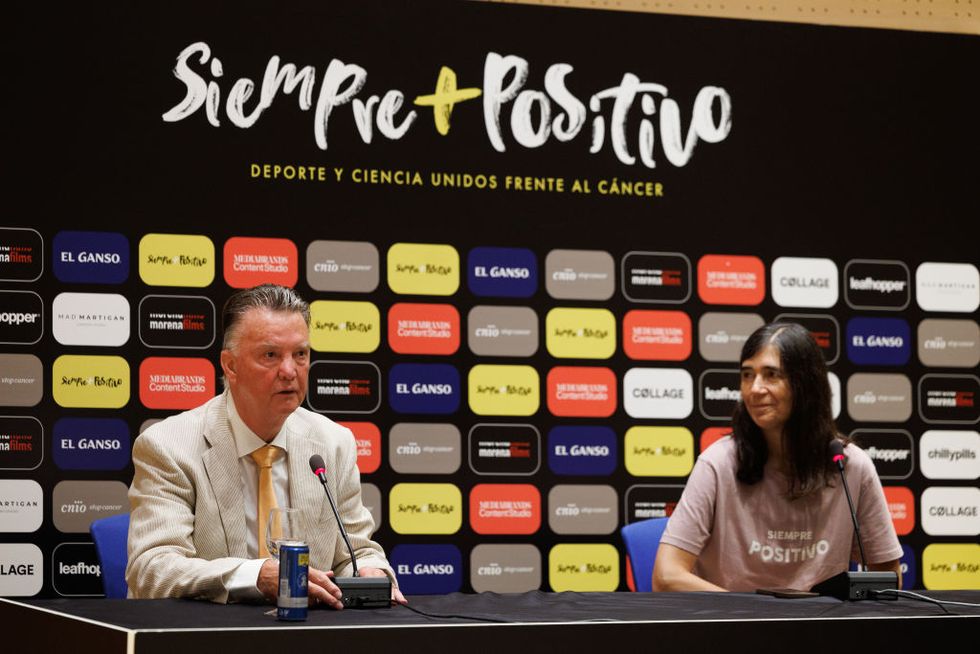
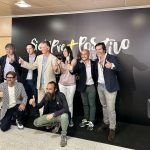
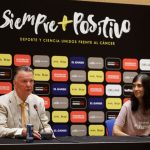

The assembly hall of the National Cancer Research Center (CNIO) in Madrid was packed. Despite being one of the most cutting-edge centers in cancer research in the world and hosting some of the galactics of the world of science, such as its scientific director María Blasco, they had never had an event that had caused so much expectation. The cause of such a stir was none other than Louis Van Gaal (Amsterdam, 1951). The former Barcelona coach and former Dutch coach was there to present a very special campaign. Under the motto “Always positive” and alluding to that press conference 25 years ago in which he accused a journalist of being “Always negative, never positive”, this campaign aims to allocate all the proceeds from an El Ganso capsule collection designed for the occasion [a la venta en la web y las tiendas físicas]“we will invest in signing the teams that fight against cancer in our center,” according to Blasco herself.
For this campaign, the production company Morena Films has also prepared a documentary of almost fifteen minutes that can be seen on the campaign page in which Van Gaal talks about this illness that he himself has recently suffered, and draws parallels with María Blasco about the world of sports and scientific research. “We both work with teams, both international and made up of the best, scientists in my case and players in yours. And we have to win too, because science is also a competition. It doesn’t matter if you’re the second to discover something, you should be the first to do it. Being second doesn’t count. So we are very competitive thanks to good training, knowledge, good ideas and, above all, perseverance. I think it’s a matter of work and trying to win and in that we are also similar to football,” says Blasco at one point in the documentary.
Van Gaal then tells what his experience with the disease was, being honest and also narrating the worst moments and is interested in what lines of research María and her teams are following. At the end, there is a very emotional moment in which Van Gaal wishes her good luck in achieving her goals in this field and she responds: “A lot of work.” To which he replies: “Good luck, because you can do the work, but you need luck” and they merge in a heartfelt hug. At the end of the viewing of this documentary and the presentation of the campaign, we are given the opportunity to have some time alone with Van Gaal. It’s not much, because there are many media outlets, but he takes his time with each one. I tell him that I’m not going to ask him about the Euro Cup, so don’t worry. [no se cuántas veces le he oído decir ya que cree que la Selección Española es la favorita, pero que en el fútbol nunca se sabe y que España en el país en el que se juega el mejor fútbol del mundo] and I go straight to the point.
To what extent have your values as an athlete been important in your personal experience in the fight against cancer, prostate cancer in your case?
I am a fighter because I am an athlete. I have played soccer, baseball, basketball, volleyball… I have played all sports because I am a physical education teacher, that is my academic training. So I know what it is to win and what it is to lose, but I am a winner and I have also been one in my fight against cancer. I always think positive and the fact that I am always thinking positive is only because I was born with this gene. Because I don’t think you can be positive and not negative when you don’t have that gene. There are people with a negative feeling and then it is more difficult to deal with this disease because this is a very intimidating disease, because there are a lot of complications, which for some people can be a disaster.
How do you remember the moment you go to the hospital and they tell you that you have cancer?
I remember it perfectly because they were telling me that I had cancer and my wife was next to me crying. But I was fine because I know from experience that it’s part of life, because as you know [lo cuenta en el documental], my family’s history has not been easy. My father died when I was 11 years old and, of the nine children they had, six are already dead. Also, my first wife died of cancer too, so I know death is a part of life but, because I’m very positive, I can live with it. That is why I am proud to be part of this campaign.
In football, a goal can end a game, but in cancer this is not the case. According to his experience, what can bring victory in the case of this disease?
Victory can only be measured with data, as María Blasco is doing. With data, like the ones she and her team have. And I cannot say that I have defeated cancer because I have already suffered it and because there is the possibility that it could return. Now, at this moment I don’t believe it, because I am very well. I’m trying to stay in shape, take care of myself even though it’s very difficult and I’m thinking positively. These ingredients are very good for living and moving forward, but I also had a time in my illness when I thought that, to live this way, I better leave. That was not very pleasant for my wife, so I solved it through positive thinking, I have managed to go further and I am very happy to be sitting here answering your questions.
You have said that you are trying to take care of yourself and yet you have confessed that you continue drinking coffee and alcohol…
I have to get back into shape, but it’s not that easy at the moment. And I have to drink less alcohol and less coffee, but it will be the last thing I will do. First I’m going to build my fitness, and when it’s coming back, then I’ll drink less coffee and less alcohol because I don’t want to change my lifestyle and my lifestyle is drinking coffee and alcohol. Not beer, but wine and, especially, Spanish wine. I learned to drink wine here in Barcelona, Rioja, Ribera del Duero…
Finally, what would you like to read, in a few years, that has been achieved thanks to the money raised with this campaign?
I just hope a lot of money is raised for this good cause. That’s why I’m here and if I have to tell my story twenty times I will. But I hope that the reaction of the people is very good and especially that of the sponsors. Because they can get a lot of money for the right purpose and this is one of the best purposes. I am also an ambassador for a foundation for children with muscular diseases and I know that sponsors are the most important people, because they have the money. So I hope that the sponsors in this case will work and earn a lot of money for this cause.

Ana is an expert on cars and automotive topics at Esquire, with experience on this topic spanning more than 20 years. She is responsible for the Motor section of the website and regularly writes about the latest news and the most surprising curiosities for automotive lovers. Thus, it is not unusual to see her writing about the cars of the future or classic vehicles that never go out of style.
His extensive career as a journalist has also led him to write about other types of content, such as Science, Music or Gastronomy. But if there is something he is passionate about, it is interviews. Iñigo Errejón, C. Tangana, Luis García Montero, El Sapo, Aitana, Sebastián Yatra or Luis Fonsi. Nobody resists him.
Ana defines herself, above all, as a “restless mind.” She began her career as an intern at Car and Driver magazine (well, she had already dabbled in Radio Intercontinental on a local culture program), so she has been testing and writing about cars for more than 20 years. . In 2000 she became part of QUO magazine, where she wrote about motors, technology and did a lot of scientific dissemination for 16 years. “I might do a neurology report one month or a paleontology report the next,” she likes to say.
And she shouldn’t have done so badly when she was awarded some of the most prestigious dissemination awards in the country, from a second prize in the Communication Award of the Official College of Psychologists of Madrid to becoming the winner of the first edition of the IVI journalism award in Maternal-fetal health category [también fue dos veces finalista de los Premios de Periodismo y Divulgación de Salud Boehringer Ingelheim]. She is the author of the popular science book the because of the causes (Ed. Ma Non Tropo) and has been a radio collaborator on programs such as Ser curious (Cadena Ser) and It is not an ordinary day (RNE). In her last stage at QUO she launched the gastronomy, trends and lifestyle sections, which led her to also collaborate in EGO magazine and later end up as section head at Esquire, where she has written since 2017.
Ana Pérez has been addicted to TV since she was a child, so it was by watching it that she discovered that she wanted to be a journalist. The Informe Semanal program and Julia Otero were her first crush on journalism. So she graduated in Journalism from the Faculty of Information Sciences of the Complutense University of Madrid in 1998 and then she signed up for a bombing by taking courses in International Information, radio, video editing, etc. Because she is convinced that knowledge does not take up space, only space in the cloud…

